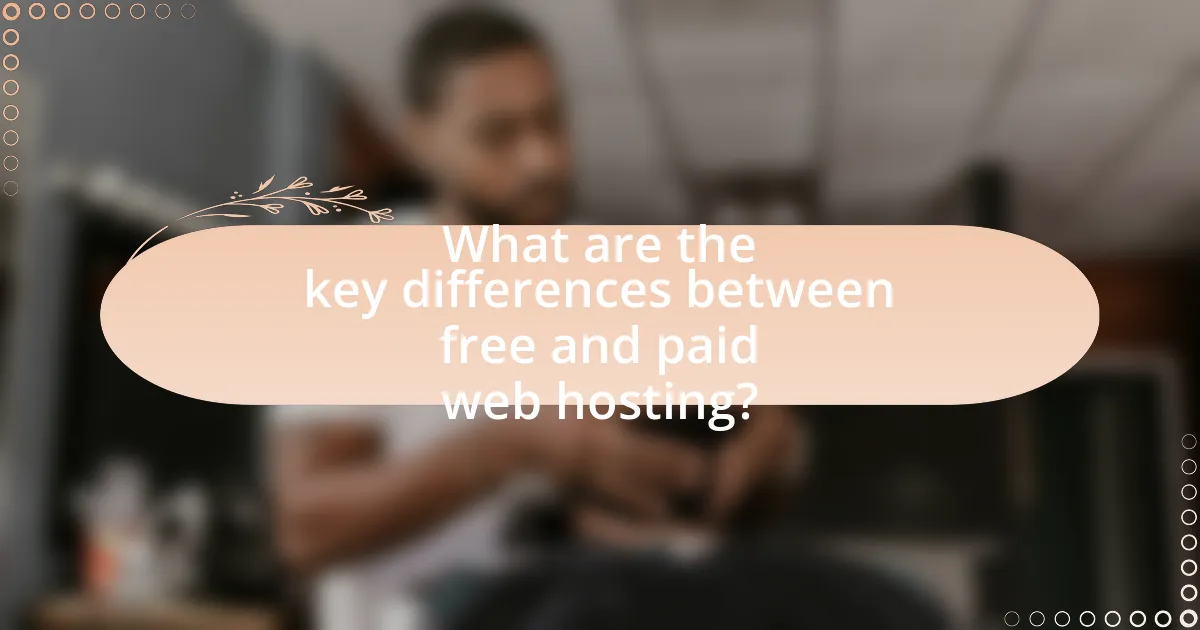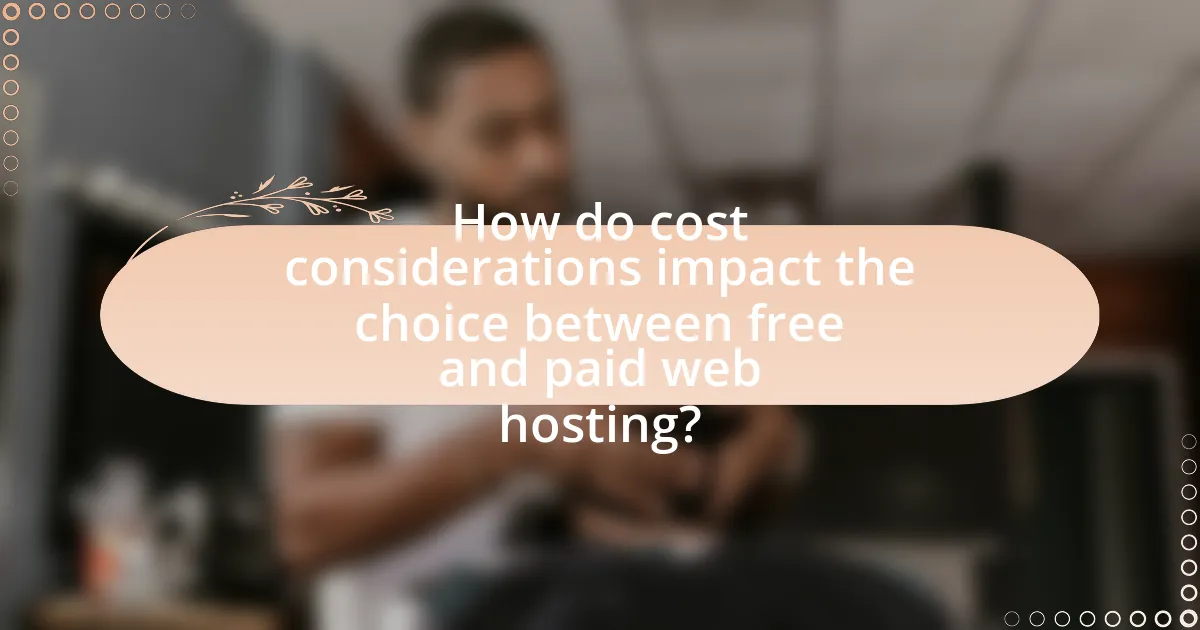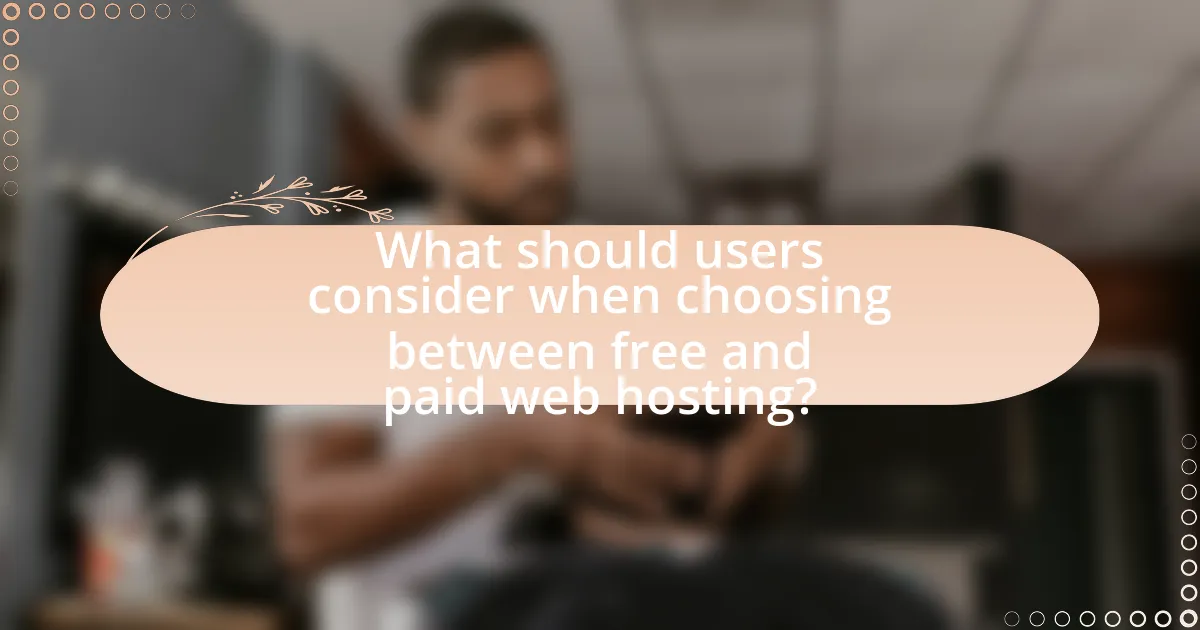The article examines the performance trade-offs between free and paid web hosting services, highlighting key differences in resources, reliability, and support. Free web hosting often comes with limitations such as restricted bandwidth, lower performance, and minimal customer support, which can negatively impact user experience and website functionality. In contrast, paid hosting offers dedicated resources, enhanced security, and better scalability, resulting in improved loading speeds and uptime reliability. The article also discusses factors influencing performance, the hidden costs associated with free hosting, and best practices for optimizing website performance regardless of the hosting type.

What are the key differences between free and paid web hosting?
Free web hosting typically offers limited resources, lower performance, and fewer features compared to paid web hosting. Free hosting often includes ads, restricted bandwidth, and limited storage, which can hinder website performance and user experience. In contrast, paid hosting provides dedicated resources, enhanced security, customer support, and greater customization options, allowing for better scalability and reliability. For example, a study by HostingAdvice found that paid hosting services can improve website loading speeds by up to 50%, significantly impacting user retention and SEO rankings.
How does the performance of free web hosting compare to paid options?
Free web hosting typically offers lower performance compared to paid options. Paid web hosting services generally provide faster loading times, better uptime reliability, and enhanced server resources. For instance, a study by HostingAdvice found that paid hosting plans can achieve uptime rates of 99.9% or higher, while free hosting often struggles to maintain consistent uptime, sometimes dropping below 90%. Additionally, paid services usually include features like dedicated bandwidth and customer support, which are often limited or nonexistent in free hosting plans. This disparity in performance is crucial for businesses that rely on their websites for revenue and customer engagement.
What factors influence the performance of free web hosting services?
The performance of free web hosting services is influenced by several key factors, including server resources, bandwidth limitations, customer support, and advertising presence. Server resources, such as CPU and RAM, are often limited in free hosting, leading to slower load times and reduced performance during high traffic. Bandwidth limitations can restrict the amount of data transferred, causing websites to become inaccessible if exceeded. Customer support is typically minimal or non-existent, which can hinder troubleshooting and resolution of performance issues. Additionally, free hosting services often display advertisements, which can detract from user experience and perceived performance. These factors collectively contribute to the overall effectiveness and reliability of free web hosting services.
How do paid web hosting services enhance performance?
Paid web hosting services enhance performance by providing dedicated resources, faster server speeds, and improved uptime reliability. These services allocate specific bandwidth and storage to each user, minimizing the risk of slowdowns caused by shared resources, which is common in free hosting options. For instance, paid hosting often utilizes SSD storage, which can significantly increase data retrieval speeds compared to traditional HDDs. Additionally, many paid services offer Content Delivery Network (CDN) integration, which reduces latency by distributing content across multiple global servers. According to a study by Google, websites that load within two seconds have a 50% lower bounce rate, highlighting the importance of speed in user retention.
What are the limitations of free web hosting?
Free web hosting has several limitations, including restricted bandwidth, limited storage space, lack of customer support, and the presence of advertisements. These constraints can hinder website performance and user experience. For instance, many free hosting services impose bandwidth caps that can lead to slow loading times or downtime during high traffic periods. Additionally, storage limitations often restrict the amount of content a website can host, which can affect its functionality and scalability. The absence of reliable customer support means that users may struggle to resolve issues promptly, impacting their website’s uptime and performance. Furthermore, free hosting providers typically display ads on users’ websites, which can detract from the site’s professionalism and user engagement.
How do bandwidth and storage limits affect website performance?
Bandwidth and storage limits significantly impact website performance by restricting the amount of data that can be transmitted and stored. Limited bandwidth can lead to slower loading times, as the server may struggle to deliver content quickly to users, especially during peak traffic periods. For instance, a website with a bandwidth cap of 1 GB per month may experience throttling or downtime once that limit is reached, resulting in a poor user experience. Similarly, inadequate storage can hinder the ability to host large files or databases, which can lead to errors or incomplete content delivery. Research indicates that websites with optimal bandwidth and storage configurations load 50% faster than those with restrictive limits, highlighting the importance of these factors in maintaining efficient website performance.
What security risks are associated with free web hosting?
Free web hosting poses significant security risks, including data breaches, malware infections, and lack of support for security updates. Users of free hosting services often share server resources with numerous other sites, increasing vulnerability to attacks such as cross-site scripting and SQL injection. Additionally, free hosting providers may not implement robust security measures, leaving user data exposed. A study by the University of Maryland found that 68% of free web hosting services had critical vulnerabilities, highlighting the inherent risks associated with these platforms.
What advantages do paid web hosting services offer?
Paid web hosting services offer enhanced performance, reliability, and support compared to free options. These services typically provide faster loading times due to dedicated resources, which can improve user experience and SEO rankings. Additionally, paid hosting often includes better uptime guarantees, often exceeding 99.9%, ensuring that websites remain accessible to users. Furthermore, paid services usually offer customer support through various channels, including live chat and phone, which is often lacking in free hosting. Security features, such as SSL certificates and regular backups, are also more robust in paid hosting, protecting websites from potential threats.
How does customer support differ between free and paid hosting?
Customer support significantly differs between free and paid hosting, primarily in availability and quality. Free hosting services often provide limited or no customer support, relying on community forums or self-help resources, which can lead to slower resolution times and less personalized assistance. In contrast, paid hosting typically offers dedicated customer support through multiple channels, such as live chat, phone, and email, ensuring faster response times and more comprehensive help. For instance, a study by HostingAdvice found that 70% of paid hosting providers offer 24/7 support, while only 30% of free hosting services do, highlighting the disparity in support quality and accessibility.
What scalability options are available with paid web hosting?
Paid web hosting offers several scalability options, including resource upgrades, dedicated servers, cloud hosting, and managed hosting services. Resource upgrades allow users to increase bandwidth, storage, and processing power as their website traffic grows. Dedicated servers provide exclusive resources for high-traffic sites, ensuring optimal performance. Cloud hosting enables dynamic resource allocation, allowing websites to scale up or down based on demand, which is particularly beneficial during traffic spikes. Managed hosting services often include scalability features, such as automatic backups and updates, which facilitate growth without requiring extensive technical knowledge. These options ensure that businesses can adapt their hosting solutions to meet changing needs effectively.

How do cost considerations impact the choice between free and paid web hosting?
Cost considerations significantly influence the choice between free and paid web hosting by determining the level of resources, support, and reliability available to users. Free web hosting often comes with limited bandwidth, storage, and features, which can hinder website performance and scalability. In contrast, paid web hosting typically offers enhanced resources, better uptime guarantees, and customer support, which are crucial for businesses that rely on their online presence. For instance, a study by HostingAdvice found that 70% of users experienced slower load times with free hosting compared to paid options, directly impacting user experience and SEO rankings. Therefore, while free hosting may seem cost-effective initially, the long-term performance trade-offs often make paid hosting a more viable option for serious web projects.
What are the hidden costs of free web hosting?
The hidden costs of free web hosting include limited resources, lack of customer support, and potential security vulnerabilities. Free web hosting services often impose restrictions on bandwidth, storage, and website performance, which can lead to slow loading times and downtime. Additionally, these services typically do not offer reliable customer support, leaving users to troubleshoot issues independently. Security is another concern, as free hosting providers may not implement robust security measures, increasing the risk of data breaches or malware attacks. According to a study by HostingAdvice, 70% of free hosting users reported experiencing performance issues, highlighting the trade-offs associated with opting for free services over paid alternatives.
How can advertising on free hosting affect user experience?
Advertising on free hosting can negatively impact user experience by introducing intrusive ads that disrupt content consumption. Users often encounter pop-up ads, banner ads, or video ads that can slow down page loading times and distract from the primary content. Research indicates that 70% of users find ads on free hosting sites annoying, which can lead to higher bounce rates and decreased user engagement. Additionally, the presence of ads can diminish the perceived credibility of the website, as users may associate excessive advertising with lower quality or untrustworthy content.
What are the long-term financial implications of choosing free hosting?
Choosing free hosting can lead to significant long-term financial implications, primarily due to limitations in scalability, reliability, and support. Free hosting often comes with restricted bandwidth and storage, which can hinder website performance and growth, potentially resulting in lost revenue opportunities. Additionally, the lack of professional support can lead to increased downtime and security vulnerabilities, which may necessitate costly emergency fixes or migrations to paid services later. According to a study by HostingAdvice, businesses that initially opt for free hosting may incur up to 50% more costs in the long run when transitioning to paid hosting due to these factors.
How does the pricing of paid web hosting vary?
The pricing of paid web hosting varies based on several factors, including the type of hosting service, features offered, and the level of customer support. Shared hosting typically costs between $2 to $10 per month, while VPS hosting ranges from $20 to $100 per month, and dedicated hosting can exceed $100 monthly. The variation in pricing is influenced by the resources allocated to each type, such as bandwidth, storage, and processing power. For instance, a shared hosting plan may offer limited resources suitable for small websites, while a dedicated server provides extensive resources for high-traffic sites. Additionally, premium features like SSL certificates, backups, and enhanced security can further increase costs, with some providers charging extra for these add-ons.
What factors contribute to the cost of paid web hosting plans?
The cost of paid web hosting plans is influenced by several key factors, including server resources, support services, and additional features. Server resources, such as bandwidth, storage, and processing power, directly impact pricing; for instance, plans with higher bandwidth and storage typically cost more. Support services, including 24/7 customer service and technical assistance, also contribute to the overall cost, as premium support options are often included in higher-priced plans. Additionally, features like domain registration, SSL certificates, and website builders can increase the price of hosting plans, as these add value and functionality for users.
How can users find the best value in paid web hosting services?
Users can find the best value in paid web hosting services by comparing features, pricing, and customer support across different providers. Evaluating essential features such as storage, bandwidth, uptime guarantees, and scalability helps users identify which services meet their specific needs. Additionally, analyzing pricing structures, including introductory offers and renewal rates, allows users to understand the long-term costs associated with each service. Customer support quality, measured through reviews and response times, is also crucial, as reliable support can significantly impact user experience. According to a 2022 survey by HostingAdvice, 70% of users prioritize customer support when selecting a hosting provider, highlighting its importance in determining overall value.

What should users consider when choosing between free and paid web hosting?
Users should consider reliability, performance, support, and features when choosing between free and paid web hosting. Free web hosting often comes with limited resources, slower speeds, and less uptime, which can negatively impact website performance. In contrast, paid hosting typically offers better reliability, faster loading times, and higher uptime guarantees, often exceeding 99.9%. Additionally, paid services usually provide customer support, which is often lacking in free options, ensuring that users can resolve issues promptly. Features such as domain registration, SSL certificates, and storage capacity are also more robust in paid hosting plans, enhancing overall website functionality and security.
What specific needs should guide the decision-making process?
The specific needs that should guide the decision-making process in the context of performance trade-offs between free and paid web hosting include reliability, scalability, support, and security. Reliability is crucial as it ensures that the website remains accessible to users; studies show that 99.9% uptime is a standard expectation for paid hosting services, while free options often lack such guarantees. Scalability is important for accommodating growth; paid hosting typically offers more resources and flexibility to handle increased traffic. Support is another key need; paid hosting services usually provide 24/7 customer support, which is often limited or non-existent in free hosting. Lastly, security is vital to protect sensitive data; paid hosting often includes advanced security features, while free hosting may expose websites to higher risks of breaches. These specific needs collectively inform the decision-making process by highlighting the trade-offs between cost and essential service quality.
How do website goals influence the choice of hosting type?
Website goals significantly influence the choice of hosting type by determining the required performance, reliability, and scalability. For instance, an e-commerce site aiming for high traffic and fast load times will necessitate a paid hosting solution that offers dedicated resources and robust security features, unlike a personal blog that may function adequately on free hosting with limited bandwidth. Research indicates that 47% of consumers expect a webpage to load in two seconds or less, highlighting the importance of selecting a hosting type that aligns with the website’s objectives for user experience and operational efficiency.
What role does expected traffic play in selecting hosting?
Expected traffic significantly influences the selection of web hosting by determining the necessary resources and performance capabilities required to handle user demand. High expected traffic necessitates a hosting solution that offers greater bandwidth, storage, and processing power to ensure website stability and speed, which are critical for user experience and SEO rankings. For instance, shared hosting may suffice for low-traffic sites, but as traffic increases, dedicated or VPS hosting becomes essential to prevent downtime and slow loading times, which can lead to a loss of visitors and revenue.
What are the best practices for optimizing performance regardless of hosting type?
To optimize performance regardless of hosting type, implement caching strategies, utilize a Content Delivery Network (CDN), and optimize images and files. Caching reduces server load and speeds up content delivery by storing frequently accessed data, while a CDN distributes content across multiple servers globally, decreasing latency. Optimizing images and files involves compressing them to reduce load times without sacrificing quality. According to Google, optimizing images can improve page load speed by up to 80%, significantly enhancing user experience and search engine rankings.
How can website owners improve loading speeds on free hosting?
Website owners can improve loading speeds on free hosting by optimizing images, minimizing HTTP requests, and utilizing browser caching. Optimizing images involves compressing them to reduce file size without sacrificing quality, which can significantly decrease load times. Minimizing HTTP requests can be achieved by combining CSS and JavaScript files, thus reducing the number of files the server must load. Utilizing browser caching allows frequently accessed resources to be stored locally on users’ devices, which speeds up subsequent visits. These methods are supported by studies indicating that optimized images can reduce load times by up to 80%, and effective caching strategies can improve performance by 50% or more.
What optimization techniques are essential for paid hosting users?
Essential optimization techniques for paid hosting users include content delivery network (CDN) integration, caching strategies, and database optimization. CDNs enhance website speed by distributing content across multiple servers globally, reducing latency. Caching strategies, such as server-side caching and browser caching, minimize load times by storing frequently accessed data. Database optimization techniques, including indexing and query optimization, improve data retrieval efficiency. These methods collectively enhance performance, ensuring faster load times and better user experience, which is critical for maintaining competitive advantage in online environments.